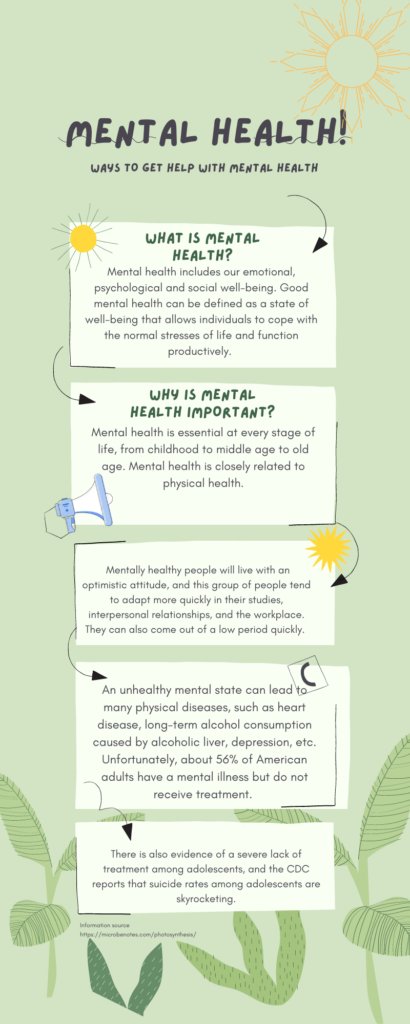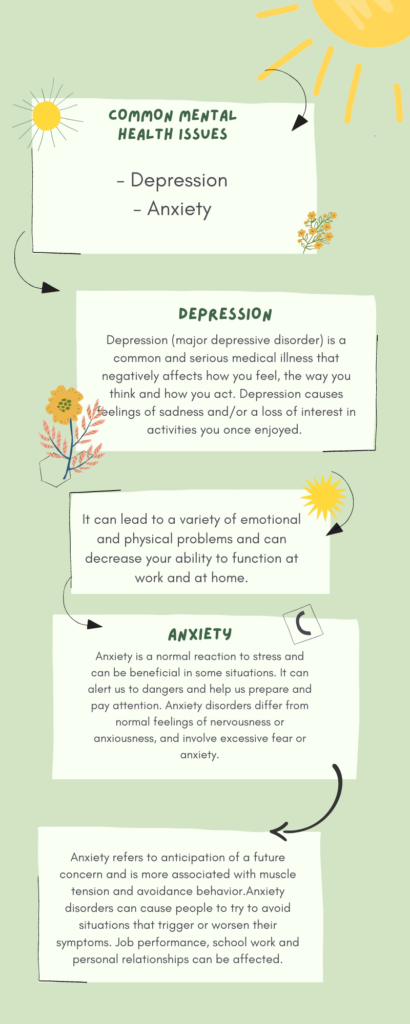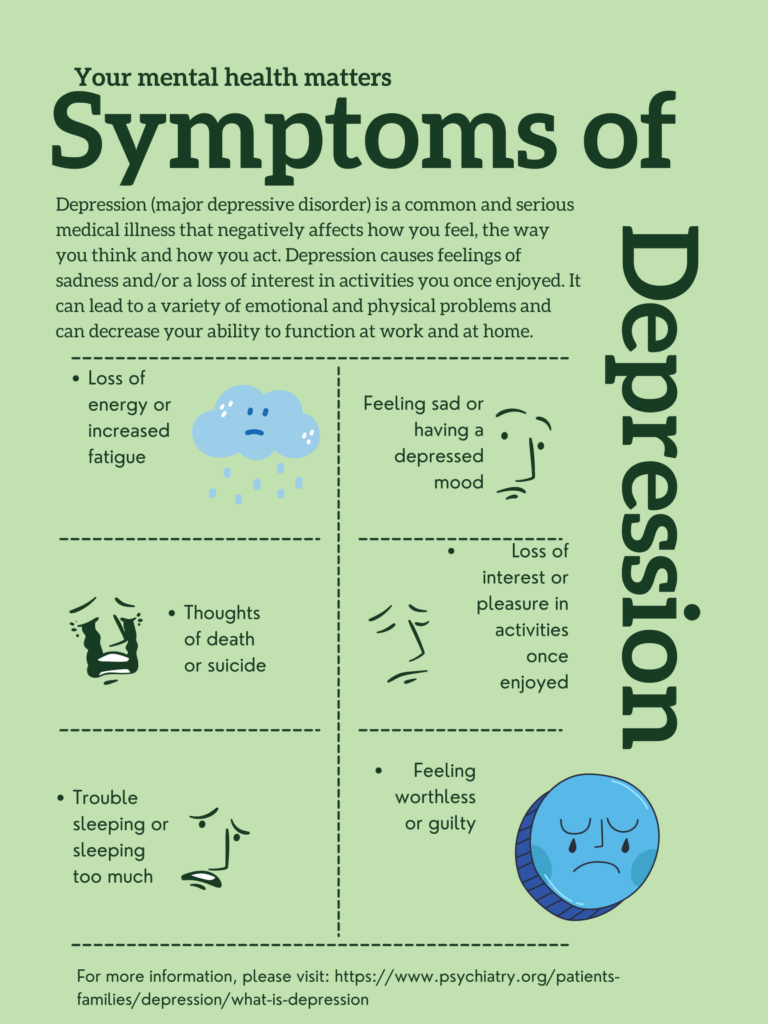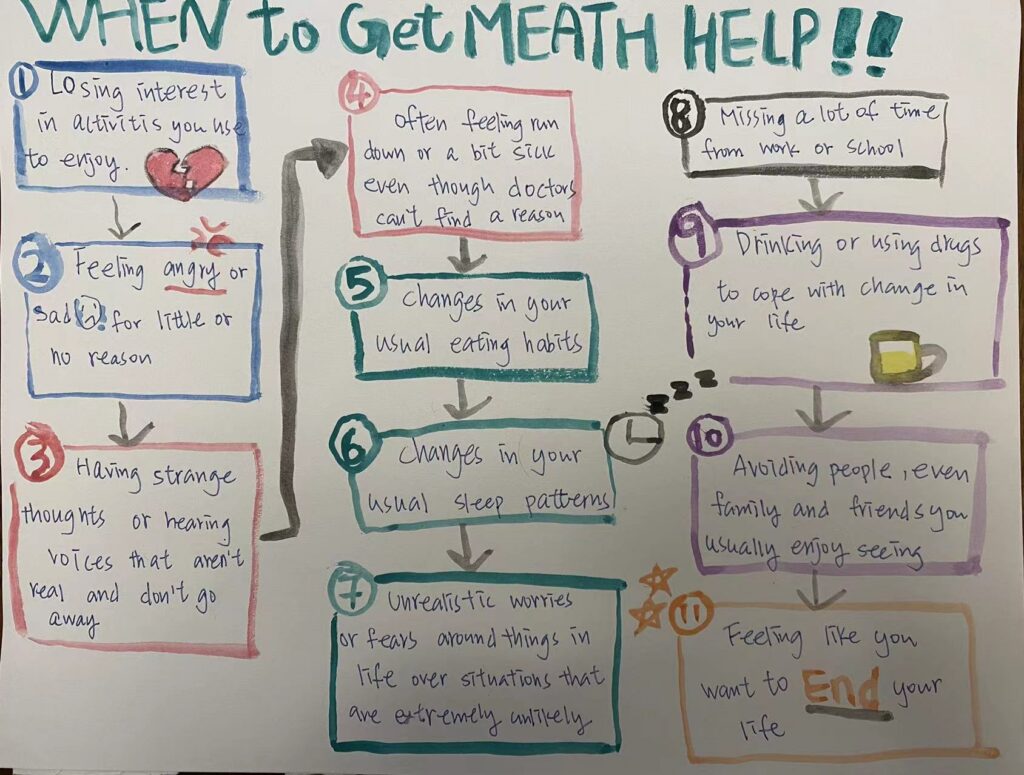Learning Objectives. By the end of this topic, you should be able to:
- Understand what mental health is.
- Know why mental health is important to us.
- Learn the potential mental health problems.
- Identify whether you need help in mental health issues.
- Learn how to get help with mental health in different ways.
Introduction
What is mental health?
Mental health includes our emotional, psychological and social well-being. Good mental health can be defined as a state of well-being that allows individuals to cope with the normal stresses of life and function productively (Fusar-Poli, 2020)
Mental health is essential at every stage of life, from childhood to middle age to old age. Mental health is closely related to physical health. Mentally healthy people will live with an optimistic attitude, and this group of people tend to adapt more quickly in their studies, interpersonal relationships, and the workplace. They can also come out of a low period quickly.
An unhealthy mental state can lead to many physical diseases, such as heart disease, long-term alcohol consumption caused by alcoholic liver, depression, etc. About 56% of American adults have a mental illness but do not receive treatment. There is also evidence of a severe lack of treatment among adolescents, and the CDC reports that suicide rates among adolescents are skyrocketing.[1]


Common mental health issues
Depression
- Feeling sad or having a depressed mood
- Loss of interest or pleasure in activities once enjoyed
- Changes in appetite — weight loss or gain unrelated to dieting
- Trouble sleeping or sleeping too much
- Loss of energy or increased fatigue
- Increase in purposeless physical activity (e.g., inability to sit still, pacing, handwringing) or slowed movements or speech (these actions must be severe enough to be observable by others)
- Feeling worthless or guilty
- Difficulty thinking, concentrating or making decisions
- Thoughts of death or suicide

Anxiety
Anxiety is a normal reaction to stress and can be beneficial in some situations. It can alert us to dangers and help us prepare and pay attention. Anxiety disorders differ from normal feelings of nervousness or anxiousness and involve excessive fear or anxiety. Anxiety refers to anticipation of a future concern and is more associated with muscle tension and avoidance behavior. Anxiety disorders can cause people to try to avoid situations that trigger or worsen their symptoms. Job performance, school work and personal relationships can be affected.
There are several types of anxiety disorders, including generalized anxiety disorder, panic disorder, specific phobias, agoraphobia, social anxiety disorder and separation anxiety disorder.
Therefore, when you find it difficult to get out of a difficult situation, with long-term stress and anxiety symptoms and cannot digest themselves, you should seek timely mental health help for yourself.
When to get mental health help
There are many ways in which mental ill health can manifest itself, and these symptoms vary from person to person and are classified as mild, moderate or severe. When you experience one or more of the following manifestations, you should obtain mental health help. [3]
- Losing interest in activities you used to enjoy
- Feeling angry or sad for little or no reason
- Having strange thoughts or hearing voices that aren’t real and don’t go away
- Often feeling run down or a bit sick even though doctors can’t find a reason
- Changes in your usual eating habits
- Changes in your usual sleep patterns
- Unrealistic worries or fears around things in life over situations that are extremely unlikely
- Missing a lot of time from work or school
- Drinking or using drugs to cope with changes in your life
- Avoiding people, even family and friends you usually enjoy seeing
- Feeling like you want to end your life

How do we get help?
The video below describes a few ways to get help
How theories were implemented
We incorporated multimedia elements of ppt video, poster, infographic and sketchnothing into Assignment 4. to achieve a diversified use of multimedia, i.e., the multimedia learning hypothesis. Learners can enhance their learning through different ways of multimedia presentations. Visual diversity increases the motivation for active learning. The screencast is used in the ppt video to closely follow the learner’s perspective so that learners can follow what is being said more intently. Ppt uses the brief point, i.e. the principle of redundancy. It allows learners to know the keywords and the focus of the article at once.
Also, we follow the elaboration theory (Reigeluth) from Topic 4 by Luke’s blog. This instructional design theory asserts that learning material should be presented in a simple to complex order while providing a meaningful context that integrates subsequent ideas. The theory includes three major approaches, conceptual elaboration sequence, theoretical elaboration sequence and simplifying conditions sequence. We use the conceptual elaboration sequence approaches when presenting what is mental health, why is mental health important, and what are some mental health issues, and follow up some common ways to get help.
References:
[1] NBCUniversal News Group. (2018, June 7). Mental Health Services: How to get treatment if you can’t afford it. NBCNews.com. Retrieved November 26, 2021, from https://www.nbcnews.com/better/health/mental-health-services-how-get-treatment-if-you-can-t-ncna875176.
[2] 6 ways to get help for mental health. ReachOut Australia. (n.d.). Retrieved November 25, 2021, from https://au.reachout.com/articles/6-ways-to-get-help-for-mental-health.
[3] Association, A. C. M. H. (n.d.). Getting help for mental illnesses. Getting Help for Mental Illnesses | Here to Help. Retrieved November 25, 2021, from https://www.heretohelp.bc.ca/infosheet/getting-help-for-mental-illnesses#need.
[4] Robinson, L. (2021, August 4). The mental health benefits of exercise. HelpGuide.org. Retrieved November 27, 2021, from https://www.helpguide.org/articles/healthy-living/the-mental-health-benefits-of-exercise.htm.
[5] Elaboration theory (reigeluth). Learning Theories. (2016, October 23). Retrieved December 3, 2021, from https://www.learning-theories.com/elaboration-theory-reigeluth.html.
[6] Doi-org.ezproxy.library.uvic.ca. (n.d.). Retrieved December 3, 2021, from https://doi-org.ezproxy.library.uvic.ca/10.1016/j.jad.2019.02.053.
[7] What are anxiety disorders? (n.d.). Retrieved December 3, 2021, from https://www.psychiatry.org/patients-families/anxiety-disorders/what-are-anxiety-disorders.
[8] What is depression? (n.d.). Retrieved December 3, 2021, from https://www.psychiatry.org/patients-families/depression/what-is-depression.